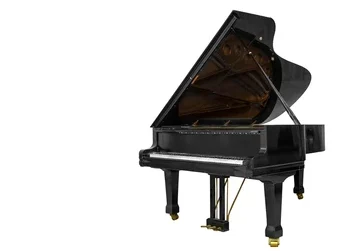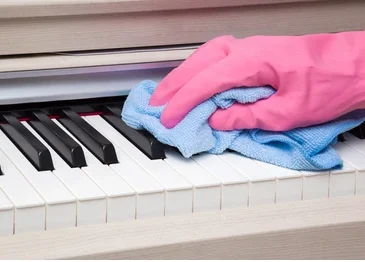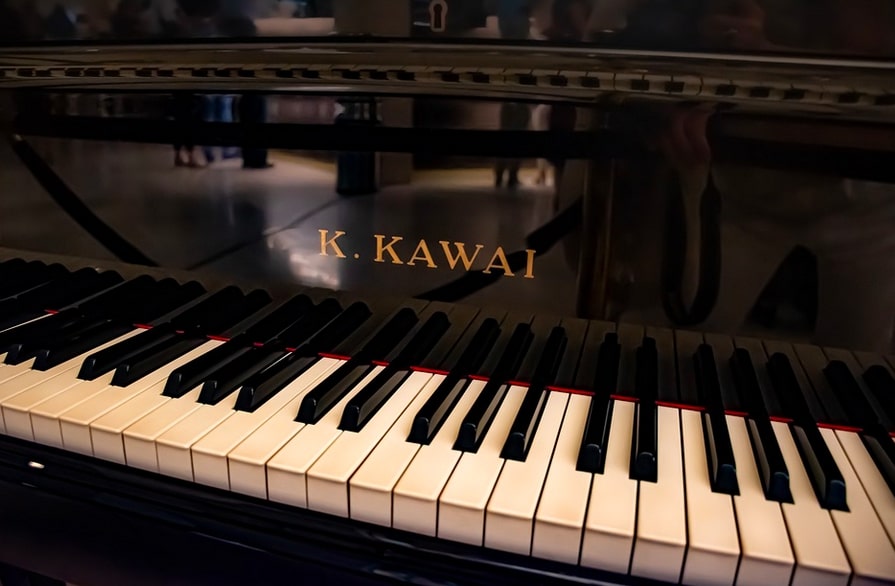
Cleaning the piano is a must to enhance its longevity. It is important to offer proper care and maintenance to prevent the settlement of dust and perspiration on the piano and also to prevent the harmful particles from damaging it extensively. It is also appropriate to choose the right type of cleaning products to clean the piano, especially its black finish.
A well-maintained piano instrument not just looks good, but it comes with a good sound as well. though it is required to perform a thorough cleaning on the piano every day, the pianist should make it a habit of dusting the piano with a soft cloth after each time they play. It is important to make sure that there is no sweat or oil residue that is left on the instrument. Following this cleaning after playing habit will avoid seeking professional help often.
Though the entire piano requires thorough and frequent cleaning, the black finish of the piano demands special care, as it is slightly different and features a different finish. On the ebony black finish, pianos develop slight scratches and streaks and they get easily visible on them. Thus it is important to take good care of the piano and harsh cleaning products should not be applied to these special musical instruments.
Cleaning and Polishing The Piano

It is understood that the black portion of these pianos is very special and is the delicate part of the instrument. Thus, it is highly recommended that we make use of appropriate products and essentials for cleaning and polishing the piano. Products that are great for ebony black piano works pretty well with both poly and lacquer finishes, and if commercial cleaning products are not available, even mild soap and water for cleansing will work wonders. On the black key tops of the piano, the black lacquer finish polish can be applied to protect its wood from being damaged. It will also project a luxurious look on the piano.
There are chances for dirt and fingerprint to damage the black keys and cause smudges on them. For a regular cleaning routine, gentle wiping with a damp cloth and dusting it with a cleaning cloth should be fine. For cleaning and wiping the piano keys, silicone-based products should not be used. Some people prefer polishing the piano but over-layering chemicals on the keys on the surface of the instrument could cause more harm to the keys than good. Polishing the black keys should be done only when necessary and shouldn’t be made a habit.

Do Commercial Cleaning Products Contain Chemicals That Will Fade The Black Color?
The lifetime of great musical instruments like the piano depends on regular cleaning. It should be properly maintained and cared for to prevent damage from dirt, perspiration, and other damaging elements. Selecting the proper cleaning supplies is also crucial, especially for a keyboard with a black surface. An instrument that has been properly maintained will not just look well but also sound good.
Even while daily thorough cleaning is not necessary, make it a habit to use a soft cloth to dust the piano after each use. This is done to make sure that the instrument is clean and free of any body oils or sweat traces. Cleaning up after one’s activities would help one avoid frequently needing professional assistance.
Whether commercial products contain chemicals that will fade away the black color depends on the proportions used and the brands of products used. However, it is highly necessary to check out the ingredients used to make the product and see if there is any disclaimer with regard to eradication of color over the course of usage.
Not all cleaning agents and polishes are made equally, and not all products respond to every surface in the same way. It is advised to evaluate the polish’s compatibility in a discrete area first if unsure. You cannot be too cautious when it comes to a beautiful black piano finish. Do this routinely before utilizing any new product.
Ebony black pianos should not be cleaned with regular Windex, which works excellent on difficult dirt and heavy stains. The instrument’s finish would be harmed by the product’s ammonia component. Unquestionably, the dirt would be eliminated, but would also leave a blue shade on the surface and might even result in fissures that would cause more harm. On the contrary side, there is a Windex alternative that is safe to use on pianos and is ammonia-free. To avoid damaging the instrument, only spray it sparingly and in small amounts onto a cleaning cloth.
What Mild Soap Can Be Used To Clean The Keys?
If a mild soap is used, the soap and water mixture is safer compared to any other cleansing product on the market. A mixed solution of 50/50 is ideal for cleaning the surface of an ebony black piano, especially those regions with tough stains or grime. A mixed solution consisting of only a coin-sized drop of the laundry detergent will work for those who have a black lacquered finish. Oil soap can also be used because it is compatible with wood.
If the piano has a clear lacquer finish (most older pianos do), Murphy’s oil soap is recommended to remove the dirt. The oil soap revitalizes the wood effectively as well. Another alternative for cleaning the finishes is Windex, however this can create streaks and is probably not going to give you what you want. There isn’t much that can be done if the paint has dried out, alligatored, or cracked; this piano really needs to have its finish reapplied. Whatever the circumstance, make sure to dry off everything after wiping the surfaces.
Cory Key-Brite is a product that performs better. Both ivory and plastic can be used with it. It is a special kind of soap meant to clean musical notes. It performs a great job cleaning the grime and grease off the keys while protecting the ivory and plastic. It stays on the rag longer than Windex does, and you might only need to find a new area on the rag every other or so octave. Once the dirt has been removed, make careful to dry wipe the keys.
Piano Polish
If it’s permissible to polish the piano, it’s one of the questions that piano owners have the most frequently. Manufacturers typically advise against polishing it because most polishes have the potential to permanently damage the finish. If it gets into the instrument, it might even hasten the corroding of the mechanism. However, there are several polishing products on the market now that can be used responsibly if used moderately. Avoid over-polishing the instrument’s surface with chemicals by not doing so frequently. However, only if absolutely essential.
If you have a piano or keyboard, you already know how important it is to keep them tidy and attractive. Dust can have an impact on a piano’s appearance as well as how it plays. Avoid letting them get extremely dirty and then attempting to handle the fallout. This creates a chain reaction of difficulties, much like an automobile. Not to mention that nobody wishes to look at a dirty or stained piano or keyboard, either to the touch or to the eye.
- Cory Ultimate Piano Care Kit
If you want your piano to look brand new, this piano cleaning package is a top seller on the market. The item is packaged in a tiny plastic clamshell along with two cloths for your use. The best thing about this product is that it doesn’t feel greasy to the touch and still produces a great stain. The key cleaner does a great job and doesn’t leave any residue or a sticky aftertaste on the keys.
- Music Nomad Piano All in One for Gloss
Only use this stuff on gloss pianos, please. Additionally, avoid doing it to your keys because it will damage them. You can use this polish along with a key cleaner made by Music Nomad. They all produce a polish for pianos with matte finishes.
- Mr. Siga Microfiber Cloth
Although this is not a kit for caring for pianos, I use it on my keyboards and pianos and it is really likable. When you use them to clean, they don’t damage your piano because they are so gentle. Additionally, they come in packs of 24, so you won’t need to order clothes all the time.
One of the common myths and practices is the application of furniture polish to the care of musical instruments. People are misinformed because the outer layer of a piano is composed of wood, despite the fact that these instruments are sensitive and require specific care. For instance, the well-known Pledge can be used successfully on any kind of wood, but it wasn’t intended for use on pianos. Owners of pianos with satin finishes would surely regret using it to polish them because it will simply leave grease behind. Imagine what would happen if the inside of the mechanism were also sprayed; the build-up of grease would wind up causing damage to both the surface and the interior.
How Often Do I Have To Clean My Black Piano?
- Even while daily thorough cleaning is not necessary, make it a habit to use a soft cloth to dust the piano after each use. This is done to make sure that the instrument is clean and free of any body oils or sweat traces. Cleaning up after one’s activities would help one avoid frequently needing professional assistance.
- Maintaining your piano is important. It retains its integrity and keeps it sounding beautiful. A special instrument that produces lovely sounds is the piano. Pianos are made from premium materials by instrument builders. Performance-based materials, however, demand greater caution. While it may be tempting to clean your instrument using household cleaning supplies, doing so could be a serious error.
- It is strongly recommended to select cleaning chemicals that are made specifically for this delicate instrument in order to give it the right care. If you have access to them, pick the proper cleaning cloth, cleaning agent, polish, and conditioner. The outcome is satisfactory and there is no risk involved. Products made for ebony black pianos may be used with both poly and glossy finishes rather well, however you should avoid putting satin sheen polish on lacquer because it contains silicone, which might eventually harm the finish. If carefully developed cleaning products are not available, use alternative safe options like soap and water solution.
- It is advisable to clean the piano every once in 6 months but this also depends on where the piano is placed and under what circumstances it is used. However, preventing dust from accumulating on your black piano can help you with keeping the piano clean and neat for longer than expected. Constantly wiping off the dust particles that set up on your black piano can be really necessary.
The Best Cleaning Procedure for the Black Finishes of Piano
For everyday cleaning of the piano, most of us resort to cleaning the piano with a clean and damp cloth, immediately followed by cleaning with a dry cloth. For stubborn stains, we can try using a mild soap solution for wiping. But there is a specific step-by-step procedure to clean and care for the black finishes of the piano.
1. Focus On The Dust First
The first step before initiating the cleaning process is to remove the dust. Accumulation of dust could create scratches on the finishing of the instrument. Gently dust the key surfaces with a feature duster then use a soft cloth slightly dipped in water to wipe off the dust. The cloth should not be rough or coarse and shouldn’t be excessively wet.
2. Following a Precise Wiping Pattern
Many times, after a formal cleaning, the streaks will be visible on the surface of the piano and this is owing to the circular wiping pattern that people follow in cleaning the piano keys. The most appropriate cleaning pattern is to use long and straight strokes and while wiping the keys with a damp and soft fabric, they should be cleaned immediately with a dry cotton cloth. Such a cleaning method will allow developing puddling and streaking.
3. Soap And Water Are The Best
Soap and water are ideal for cleaning than other cleaning products that are available in the market. But only a mild soap should be used and for cleaning the ebony black keys, the soap solution of 50-50 concentrations should be used, even if the stains and dirt are hard. It is also a good idea to use oil soap, as it works great with wood.
4. Using Denatured Alcohol With Water
One exceptional cleaning solution that works great for the piano black finishes is a mixture of water and denatured alcohol. In this alcohol, the content of ethanol is very mild and it is been adjusted to work as a cleaning agent for furniture finishes. One part of alcohol should be diluted in two parts of water to make it a perfect cleaning solution. The solution can be applied to areas of tough grime and mold with the help of a micro fabric cleaning material. After cleaning, the surface should be wiped dry.
5. Polishing
This is an optional step, but when done, it can render an excellent shine on the piano. But if the choice has been made to use a polish, then it should be tested for compatibility in an inconspicuous area. Buffer polish solution can be used to remove minor scratches from the piano. Significant scratches require professional assistance
Things to avoid while cleaning the black finish of the piano:
- Rough handling and rubbing should be avoided completely while cleaning the piano
- Furniture polish should never be used to clean the black finishes of the piano
- Regular window sprays should not be used to remove tough stains and dirt as water can enter the insides of the piano.
- Pledge should not be used to clean the piano as the chemical can damage its finish.
Bottom Line
There is nothing more satisfactory than to have a clean piano. the instrument looks great with its characteristic shine when it is cleaned regularly and appropriately. It also reflects on how best we care for the instrument. Cleaning the ebony finish of the piano is easy and simple, but is also the trickiest to attempt.
Related Guides:
- How to Connect Your Digital Piano to PC, iOS, Android Devices?
- How to Connect Headphones to Digital Piano or Keyboard?
Frequently Asked Questions (FAQs)
1. What are the important precautions to be taken while cleaning the piano?
Never use a dry or scratchy cloth. Every section includes a description of the appropriate fabric type. The instrument can get scratched by harder textiles, which is the cause. Even a small blemish on your piano can pave the way for it to deteriorate more quickly. When cleaning your casework, avoid using circular motions. You risk leaving stains on your instrument if you do this.
2. Are there any tips that can be followed for piano maintenance?
- The majority of our daily tasks needs us to use our hands, which makes them dirty.
- Additionally, oils are produced and released by our hands naturally.
- There is no way to prevent dirt and debris from getting on your instrument. However, securing the keyboard lid lessens the amount of dust that accumulates.
3. What are the precautions in terms of the environment of the piano that we have to ensure?
- Your instrument can age and become damaged by daylight, moisture, heat, and even cold. Ideally, keep your instrument out of direct sunlight, temperature-changing equipment, and dry, cool areas.
- Pets should not be allowed around your piano. Dogs and cats track a lot of dirt and trash into your shed and home.
4. How do we clean the strings of a piano?
Tune your piano after cleaning the strings. Otherwise, you’ll need to make another adjustment. Put on a mask before cleaning your strings. Your breathing air will become contaminated with rust and dust. Next, softly brush the threads with a dishpad.
5. What should one use to clean the piano keys?
Utilize vinegar and water if your keys are made of plastic. Water is necessary for ebony and ivory keys, and a small bit of soap is preferable. Do use freshwater and piano polish on the case.
